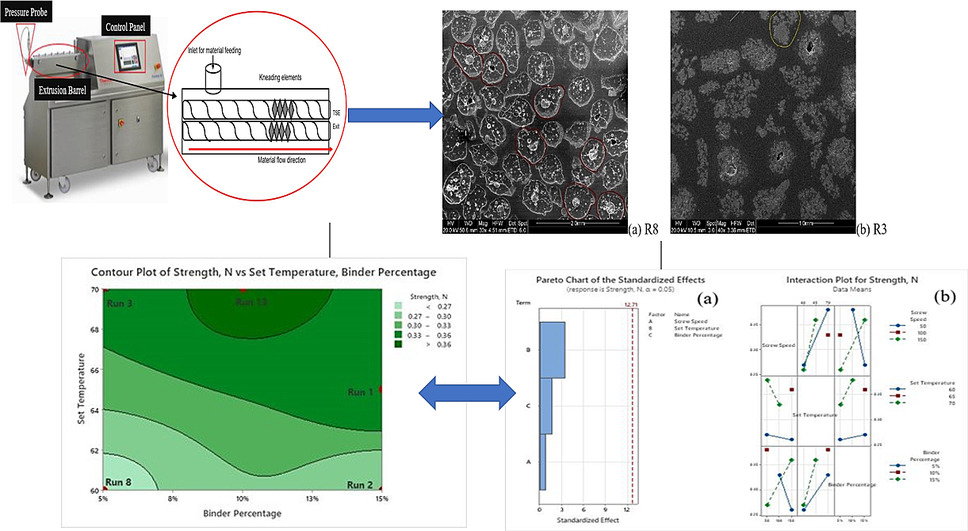Comparative analysis of granule properties in continuous granulators

Several contributions in answering granulation challenges including the use of computer simulation and well thought out experimental analyses are being researched. Using a twin screw granulator (TSG) by design of experiments (DoE), comparisons on 1) equipment similarities i.e., continuous and 2) shear forces, are made to previous literature on continuous equipment and a Cyclomix. This study proposes that equipment specific DoE, better explains the contribution of parameters than investigating an identified parameter from the experimental findings from a specific equipment.
Highlights
Equipment specific DoE gives better understanding of process-parameter effect.
Long residence times with enough binder enables denser and stronger granules.
Higher binder ratio at the same temperature improves strength.
Temperature and binder ratio strongly influence granule properties in TSE.
- Stronger granules are formed by less viscous binder at higher temperatures.
Granule strength and structure are presented together with the contribution of process parameters, speed, temperature, and binder content. Seeded structures are present in all but the Extrudomix. Longer residence times within the Cyclomix facilitates seeded structures. Granule crushing strengths are higher in TSG than all other continuous equipment. Optimum condition for the formation of stronger granules with least variation is around 65.4 °C.
2.1. Materials
Calcium carbonate (CaCO3) powder otherwise referred to as Durcal 65, produced by Omya UK, of mean particle size 96.6 μm as determined experimentally through sieve analysis (via Retsch AS 200 control sieve shaker and BS sieves) was used as the excipient and polyethylene glycol (PEG 4000) as the binder. Since the mechanism of granulation is in hot melt mode, the binder medium was added in its solid form, neither pre-melted nor made into an aqueous solution. These materials being readily available are chosen to facilitate fundamental process understanding of the material and process interactions for useful applications to more industrially relevant materials in the future. Calcium carbonate usually has a density of 2.7–2.95 (g/cm3) and a hardness of 3.0–4.0 on the Mohs scale of hardness. It has a pH of 8–9 and a corresponding melting point of 825 °C (alpha) and 1339 °C (beta) [24]. The onset melting point for PEG 4000 in this work as from differential scanning calorimetry (DSC) is about 56.5 °C and with a density of 1.2 g/cm3 at 20 °C temperature.
Read more
Nana Sekyi, Adrian Kelly, Nejat Rahmanian, Comparative analysis of granule properties in continuous granulators, Powder Technology, 2023, 118557, ISSN 0032-5910,
https://doi.org/10.1016/j.powtec.2023.118557.

